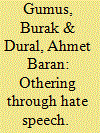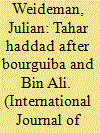| Srl | Item |
| 1 |
ID:
116410


|
|
|
|
|
| Publication |
2012.
|
| Summary/Abstract |
In heated struggles for power like election campaigns, political rivals are villainized through othering in the mass media. This is clearly the case in Turkey where society is structurally polarized along ethnic, religious, regional and political cleavages as well as sociological conflict lines between Islamists and secularists, urban (and Thracian) citizens in coastal cities and rural Anatolian villagers. The anti-Semitist (V)Akit newspaper, which attracts attention with its immoderate, militant, Sunni-Islamist discourse, used negative stereotypes in headlines and news coverage, columns, cartoons and caricatures. The daily tried to villainize its secularist rivals like Thracians and Kemalists by using inflammatory, abusive words and defamatory allegations.
|
|
|
|
|
|
|
|
|
|
|
|
|
|
|
|
| 2 |
ID:
145057


|
|
|
|
|
| Summary/Abstract |
Under the Bourguiba and Bin ʿAli regimes, the early 20th-century women's rights advocate Tahar Haddad (1899–1935) was a symbol of “state feminism.” Nationalist intellectuals traced the 1956 Personal Status Code to Haddad's work, and Bourguiba and Bin ʿAli claimed to “uphold” his ideals and “avenge” the persecution he suffered at the hands of the ʿulamaʾ at the Zaytuna mosque-university. Breaking with “old regime” narratives, this article studies Haddad as a reformist within Tunisia's religious establishment. Haddad's example challenges the idea that Islamic reformists “opened the door to” secularists in the Arab world. After independence, Haddad's ideas were not a starting point for Tunisia's presidents, but a reference point available to every actor in the political landscape.
|
|
|
|
|
|
|
|
|
|
|
|
|
|
|
|